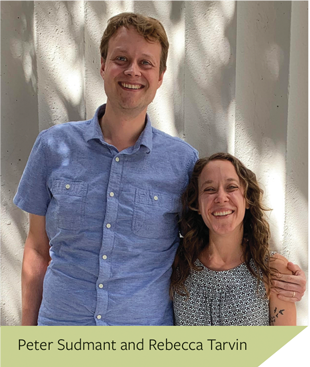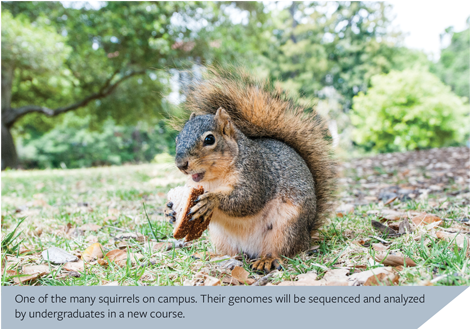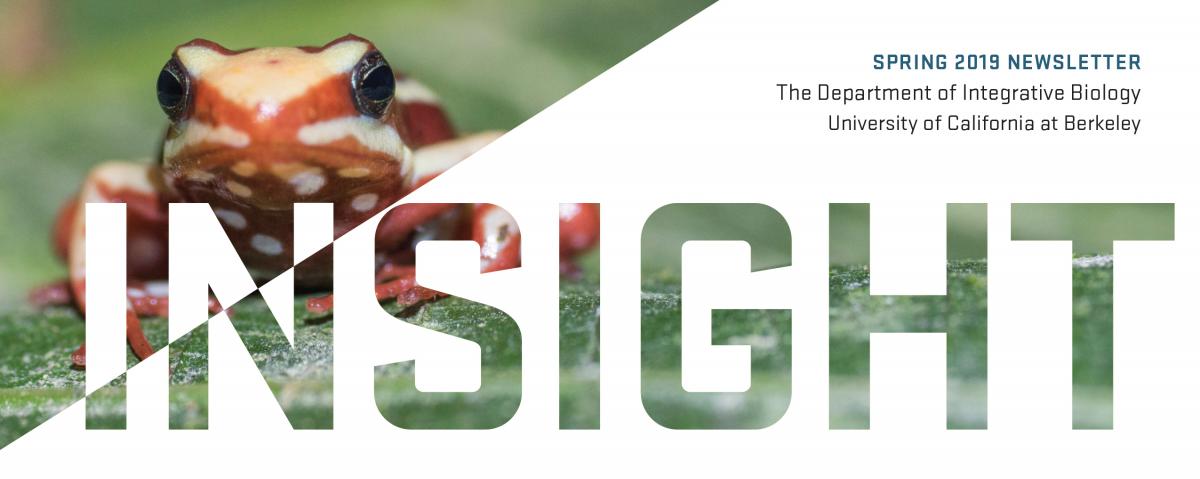
Recent advances in genomics have led new IB faculty members Rebecca Tarvin and Peter Sudmant to develop two new  undergraduate courses about the concepts, methods, and ethics of this burgeoning field. Genomics is the study of the genomes — the complete DNA sequence of an organism. Tarvin says that within the last decade there has been a revolution in genomics, resulting in the generation of massive amounts of data which biologists must learn how to analyze. “We need to provide training in bioinformatics within our undergraduate biology curriculum,” she says.
undergraduate courses about the concepts, methods, and ethics of this burgeoning field. Genomics is the study of the genomes — the complete DNA sequence of an organism. Tarvin says that within the last decade there has been a revolution in genomics, resulting in the generation of massive amounts of data which biologists must learn how to analyze. “We need to provide training in bioinformatics within our undergraduate biology curriculum,” she says.
To this end, Tarvin and Sudmant are developing a course called “Practical and Applied Vertebrate Genomics,” expected to begin in fall 2020. It is a hands-on, research-based course that will focus on the genomics of the campus squirrel population. Students will be involved in all aspects of the research, from gathering samples to largescale statistical analyses. They will explore their own research questions about the genetics of the population and how it may change over seasons and years. Sudmant says that the students “will be able to relate genomics to California natural history and to something they can see right outside their window.” The course will be one of the first of what Sudmant and Tarvin hope will be many hands-on, comprehensive, undergraduate genomics courses at Berkeley. They are also committed to making all of their materials free for use at any institution so other universities can follow suit in preparing students for the future of genomics. “The idea is to create something that is bigger than just UC Berkeley,” Sudmant says.
Due to the genomics revolution, people can now also easily get their own genomes sequenced, whether for medical purposes or their own curiosity. This led Sudmant to create another course called “Genome Architecture and Personalized Genetic Medicine,” expected to start in spring 2020. It will explore human genetic diseases from an evolutionary perspective and address “the promise and the peril of being in this genomic era,” Sudmant says.
 The inspiration for the course was Sudmant’s discovery of a chimpanzee with a microdeletion — a stretch of missing DNA — similar to that which occurs in human patients with Smith-Magenis syndrome. The chimpanzee had physical and behavioral characteristics similar to the symptoms of Smith-Magenis, which led to Sudmant’s fascination with thinking about human genetic diseases from an evolutionary perspective. The first part of the course will focus on the evolution of human genome architecture, starting with great apes. Sudmant says he will then discuss “how the evolution and structure of our genome sensitizes us to specific genetic diseases.”
The inspiration for the course was Sudmant’s discovery of a chimpanzee with a microdeletion — a stretch of missing DNA — similar to that which occurs in human patients with Smith-Magenis syndrome. The chimpanzee had physical and behavioral characteristics similar to the symptoms of Smith-Magenis, which led to Sudmant’s fascination with thinking about human genetic diseases from an evolutionary perspective. The first part of the course will focus on the evolution of human genome architecture, starting with great apes. Sudmant says he will then discuss “how the evolution and structure of our genome sensitizes us to specific genetic diseases.”
After exploring how genes relate to human disease and the potential of medical treatments tailored to our own genetics, students will learn what genetic sequences can and can’t tell us. “While our genome can provide spectacular insights into disease and ancestry, those insights can often be very limited,” Sudmant says. He wants students to be able to critically analyze some of the “hype” surrounding human genomics and to think carefully about the ethical issues involved in genetic testing.
Together, these two new courses will help prepare students for the future, both in their biology-related careers and as informed citizens.
Back to Main Spring 2019 Newsletter Page







